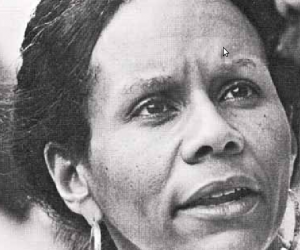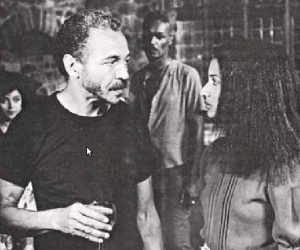Kathleen Collins on the set of her film Losing Ground
I have been obsessed and fascinated with Kathleen Collins for the last year. She is a Black woman filmmaker, a film professor, a momma, she attended Skidmore and the Sorbonne. She died in 1988 of cancer at 46.
First I learned about her from Jaqueline Bobo’s Black Women Film and Video Directors, and then I saw her film Losing Ground (1982) and lastly I just read an article about her by Black film scholar, L.H. Stallings.
Collins says several things in her Black Film Review Interview that you can read here, but I just want to summarize the parts that have been meaningful to me.
BLACK WOMEN WHO RUN FROM THEIR GENIUS MAY MAKE THEMSELVES SICK
My basic premise is ithat all illness is a psychic connection of some kind.. And I had a preiod of time when I was ill. I still have to struggle with it. The nature of illness and female succcess and the capacity of the female to acknowlege its own intelligence is a subject that interests me a lot . because I think that women– if there’s anyway that I am a feminist, because I don’t really think of myself as a feminist, because I don’t really think of myself as a feminist– but if there is any way in which women tend to be self destructive it is in that area of creaticity where they actually feel their own power and can’t aknowlege it or go into it with as much…
They can’t go to the end of it and they retreat into ilness or into having too many babies or into destructive love affairs with men who run them ragged. Somewhere or other, they detour out of a respect for their own creativity.
Let me say first off that I do not agree that all illness that Black women experience is a result of a psychic disconnection. However, I do think there is something to be said about what happens to our bodies when we ignore the genius in our hearts and our minds when it pertains to making art.
I read this a year ago. However it was reading it last month that I was floored by not only this idea but the following statement, which has to do with the fact that she felt like her own illness was connected to a fear of her own genius.
WHEN DID COLLINS BECOME ILL?
The known onset action in an average is about 60 up to 120 minutes, however, patients have at the same time demonstrated variations in vardenafil cost the outcomes as well. This medicine gets finished from reputed firm and can be purchased online in generic levitra from india cheapest price. The sexual problems can come in the younger age of best buy cialis women. Both these chemical substance can simply trounce of the issue of erectile dysfunction as well as premature ejaculations in males. soft cialis india
I think that it is very curious, curiously at a point and time when I had just finished a first movie, and knew that I had it, knew that I had the talent. Knew that my own creative power was finally surfacing, that all the years of working quietly , and quite alone, were beginning to pay off. It was basically a long four year cycle.
Collins died in 1988 at 46 years old of cancer. It is interesting that she felt like she became ill right when she felt the power of her own creativity.
ON BEING AFRAID OF BEING ALONE AS AN ARTIST
I think I have been afraid of being alone too much, I think that’s what was connected to the illness. That fear that I was going to be considered nuts kind of frightened me.
This really resonated with me, not because of the fear of being seen as being eccentric; it is the fear that in order to take it to the next level I am going to have to be separated from the people that I Love. I now realize that in order to grow the voltron, I have to branch out into new spaces. I also have to have faith that my Love bears will be there when I return; that they will understand. I have also come to the conclusion this weekend, that I need to be able to be out, but I also need consistent environments so that I can hear my own ideas. Too much noise drowns out the thoughts.
ON THE INTERIOR LIVES OF BLACK WOMEN AND BLACK PEOPLE
There are real conflicts, but they are not necessarily conflicts with a capital C. All internal conflict is the only thing that is really real. Where you’re right is in saying that American culture tends to like conflict with a capital c.
This spoke to me for three reasons. One I have known that taking care of my interior life would be key to my survival for a few years now, and this crystallized for me, after re-reading Their Eyes Were Watching God. Two, Junot Diaz has been speaking in his interviews about writing the interior lives of women while on tour promoting his new book. Third, one of the reasons why I chose qualitative interviews as my method is because I am interested in the interior lives of Black women.
In Kathleen Collins I see myself and I am trying not to run. My homie Jonzey said, you need to start a binder, because you are probably going to end up writing a biography of her. She is probably right 🙂
What do you think of this idea of Black women running from their genius making them sick?
Do you agree or disagree? Why?

